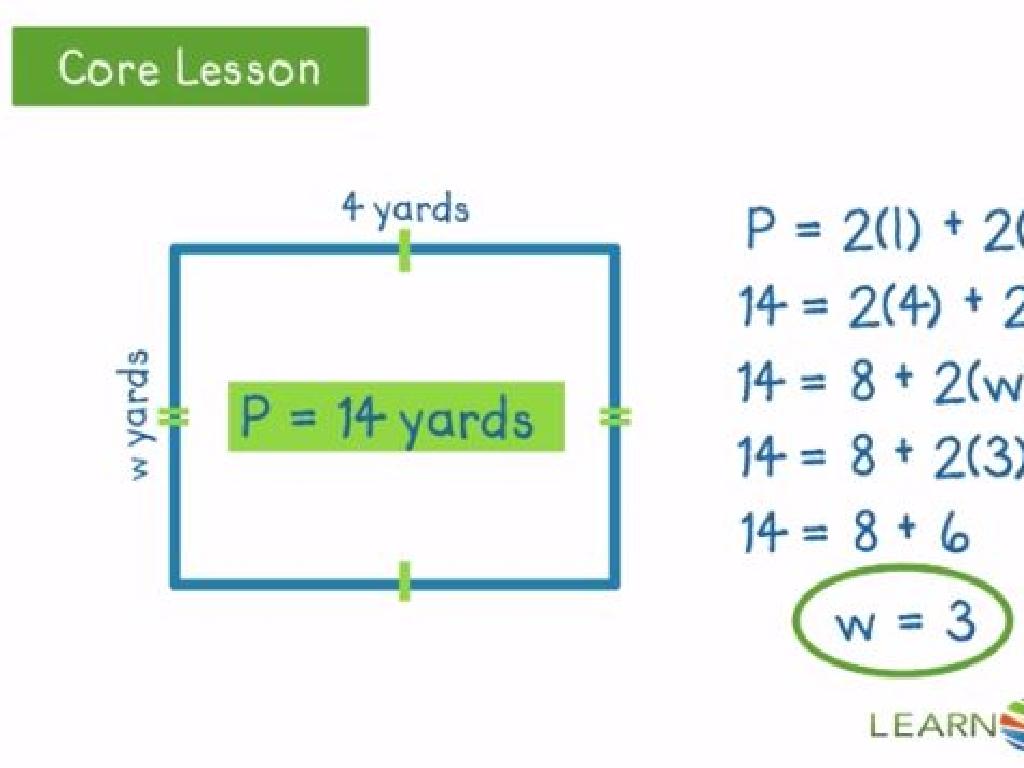Determine The Meanings Of Words With Greek And Latin Roots
Subject: Language arts
Grade: Sixth grade
Topic: Greek And Latin Roots
Please LOG IN to download the presentation. Access is available to registered users only.
View More Content
Unlocking Vocabulary: Greek and Latin Roots
– English: A language of many roots
– Greek and Latin roots explained
– Roots are the basic parts of words from ancient Greek and Latin languages.
– The significance of roots in vocabulary
– Knowing roots helps decipher unfamiliar words and expand vocabulary.
– Roots as keys to word meanings
– Recognize roots to unlock definitions of complex words.
|
This slide introduces the concept of Greek and Latin roots, which are the foundational elements of many English words. Understanding these roots can greatly assist students in expanding their vocabulary and improving their ability to determine the meaning of unfamiliar words. Emphasize the prevalence of these roots in English and their importance in learning new vocabulary. Provide examples of common roots and how they form the basis of many words students encounter in their reading. Encourage students to become ‘word detectives’ who can identify and interpret these roots to enhance their language skills.
Exploring Common Greek and Latin Roots
– Greek root ‘bio’ means life
– Examples: ‘biography’, ‘biology’
– Latin root ‘aqua’ means water
– Examples: ‘aquarium’, ‘aquatic’
– Find roots in ‘biology’, ‘geography’
– ‘Biology’ combines ‘bio’ (life) + ‘logy’ (study)
– Practice with ‘aquatic’, ‘describe’
– ‘Aquatic’ relates to water; ‘describe’ from ‘scrib’ (write)
|
This slide introduces students to the concept of Greek and Latin roots, which are the building blocks of many English words. By understanding these roots, students can better deduce the meanings of unfamiliar words. Start with the Greek root ‘bio’ and show how it forms words related to life, such as ‘biology’ (the study of life) and ‘biography’ (a written account of someone’s life). Then, introduce the Latin root ‘aqua’ and explore words like ‘aquarium’ (a water container for fish) and ‘aquatic’ (relating to water). Encourage students to identify the root in words like ‘geography’ (earth writing) and ‘symphony’ (sounds together). Provide additional practice with words like ‘describe’, showing how ‘scrib’ relates to writing. This activity will enhance vocabulary and word analysis skills.
Word Analysis: Dissecting Words
– Dissect words into components
– Identify root, prefixes, and suffixes
– Understand meanings via parts
– Analyze parts to infer word meaning
– Practice with ‘transportation’
– ‘Trans-‘ means across, ‘-port’ means carry, ‘-ation’ turns it into a noun
– Roots and affixes explained
|
This slide introduces students to the concept of word analysis by breaking down words into their Greek and Latin roots, prefixes, and suffixes. Understanding the meaning of these parts can help students infer the definition of complex words. For example, ‘transportation’ can be broken down into ‘trans-‘ (across), ‘port’ (carry), and ‘-ation’ (the action of). By combining these meanings, students can understand that ‘transportation’ refers to the action of carrying something across a space. Encourage students to practice this skill with different words and to share their breakdowns and inferred meanings with the class.
Greek and Latin Roots in Action
– Match roots with meanings
– Connect ‘bio’ with ‘life’ or ‘geo’ with ‘earth’
– Craft new words with roots
– Combine ‘tele’ (far) with ‘phone’ (sound) to form ‘telephone’
– Discuss roots in text comprehension
– Knowing ‘auto’ (self) helps understand ‘autonomy’ in texts
– Activity benefits
|
This slide introduces an interactive class activity focused on Greek and Latin roots. Students will match common roots to their meanings, which will help them deduce the meaning of unfamiliar words. They will also use a provided list of roots and affixes to create new words, fostering creativity and deeper understanding of word formation. The discussion will revolve around how this knowledge aids in comprehending more complex texts, as many English words are derived from Greek and Latin roots. The activity will enhance vocabulary skills and prepare students for encountering advanced literature. For the teacher: Prepare a list of roots, their meanings, and affixes. Consider creating a matching game or flashcards for the first part of the activity. Provide examples of complex words broken down into roots and affixes to illustrate the importance of this skill.
Exploring Roots: Understanding Words in Context
– Read passage with highlighted roots
– Infer meanings of new words
– Use root knowledge to guess word meanings
– Discuss roots and context
– Share thoughts on how roots provide clues
– Enhance vocabulary with roots
|
This slide is designed to engage students in an interactive reading activity that focuses on understanding Greek and Latin roots in context. Students will read a passage where certain words with Greek or Latin roots are highlighted. They will use their knowledge of these roots to infer the meanings of the highlighted words. After individual work, there will be a class discussion to share their inferences and understand how roots can give context and clues to the meaning of unfamiliar words. This activity will help students to enhance their vocabulary and reading comprehension skills. Teachers should prepare a passage with a variety of roots and ensure that the discussion includes examples of how roots can change the meaning of words when combined with different prefixes and suffixes.
Practice with Greek and Latin Roots
– Work on a roots-based crossword
– Solve puzzles to find words with Greek or Latin roots
– Create sentences with root words
– Use new root-based words in your own sentences
– Share sentences with the class
– Present your sentences to peers for feedback
– Discuss the root word meanings
– Explore how roots give meaning to words in discussion
|
This slide is designed for an interactive class activity focused on Greek and Latin roots. Students can work individually or in groups to complete a crossword puzzle that challenges them to apply their knowledge of word roots. Encourage them to create original sentences using words that contain common Greek or Latin roots. After crafting their sentences, students will share them with the class, providing an opportunity for peer learning. Conclude the activity with a class discussion about how the roots helped them determine the meanings of the words. This exercise will reinforce their understanding of word origins and enhance their vocabulary skills. Possible activities include creating a crossword puzzle with clues related to the meaning of root words, writing a short story that includes root-based words, or drawing a word map that connects words with the same root.
Class Activity: Root Word Tree
– Create a ‘Root Word Tree’
– Add leaves with derived words
– Write words that share the same Greek or Latin root on the leaves
– Each leaf represents a word
– Discuss vocabulary growth
– Understand how many words grow from the same root
|
This interactive class activity helps students visualize the concept of word roots and how a large vocabulary can grow from them, similar to how branches and leaves grow from the trunk of a tree. Start by drawing a large tree on the board or a poster paper, with several branches but no leaves. Explain that each branch will represent a different Greek or Latin root. Then, have students come up and add leaves to the branches, writing words that derive from each root. As the tree fills up with leaves, discuss with the class how this represents the growth of our vocabulary from these roots. Possible activities: 1) Split the class into groups, each responsible for a different root. 2) Have a competition to see which group can find the most words for their root. 3) Create a ‘forest’ of root trees for different word families. 4) Have students research the origins of their own names or other familiar words. 5) Create a digital version of the tree that can be added to throughout the year.
Wrapping Up: Greek and Latin Roots
– Recap of Greek/Latin roots
– Engage in a quick roots quiz
– Test your knowledge with a fun game
– Homework: Discover 5 words
– Find words with Greek or Latin roots
– Share findings next class
– Be ready to discuss the roots and meanings
|
As we conclude today’s lesson, it’s important to review the key points about Greek and Latin roots. These roots are the building blocks of many words in the English language, and understanding them can greatly enhance vocabulary and comprehension. To reinforce learning, conduct a quick quiz or a playful game that involves the roots discussed today. For homework, students should find five new words that contain Greek or Latin roots and note their meanings. They will present these words in the next class, which will help solidify their understanding and encourage independent learning. Prepare a list of activities for the quiz or game to make the review session interactive and enjoyable.






